Project 2: Leadership and Management in Business Context
VerifiedAdded on 2020/10/04
|16
|5075
|437
Project
AI Summary
This project delves into the core concepts of leadership and management, differentiating between the two and highlighting their distinct roles within an organization. It examines trait leadership theory, focusing on the inherent personality characteristics that contribute to effective leadership. The project further explores management development programs, specifically in the context of Tesco, analyzing their emphasis on leadership development. The main body of the project provides a detailed definition and concept of leadership and management, including the key features and characteristics of each. It then provides an in-depth analysis of the trait leadership theory, outlining the core traits of leaders and their impact on organizational efficiency. The project concludes by summarizing the key differences between leadership and management, emphasizing the importance of both for organizational success. This assignment is a great resource for students to understand the nuances of leadership and management, and how the traits and programs can be applied in a business context.
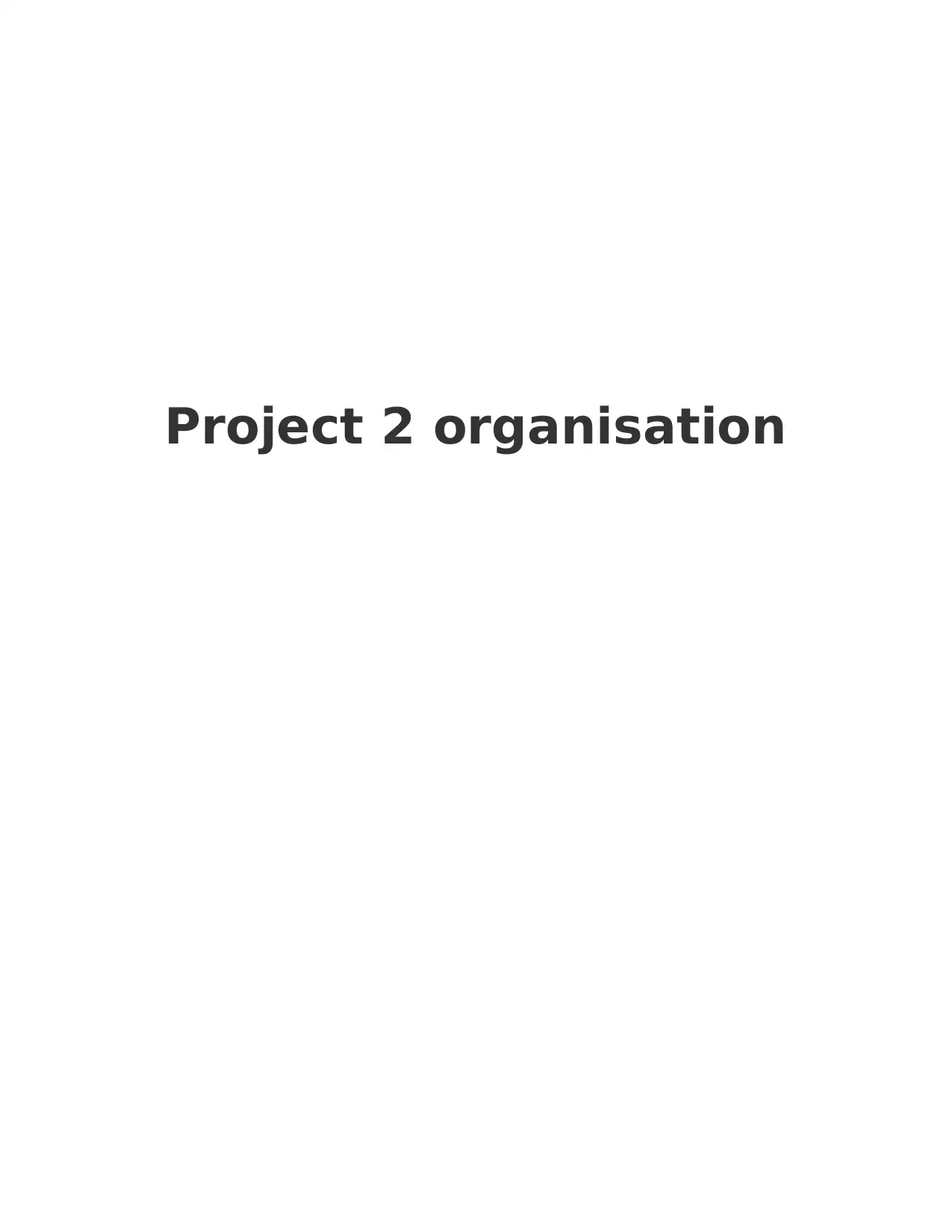
Project 2 organisation
Paraphrase This Document
Need a fresh take? Get an instant paraphrase of this document with our AI Paraphraser
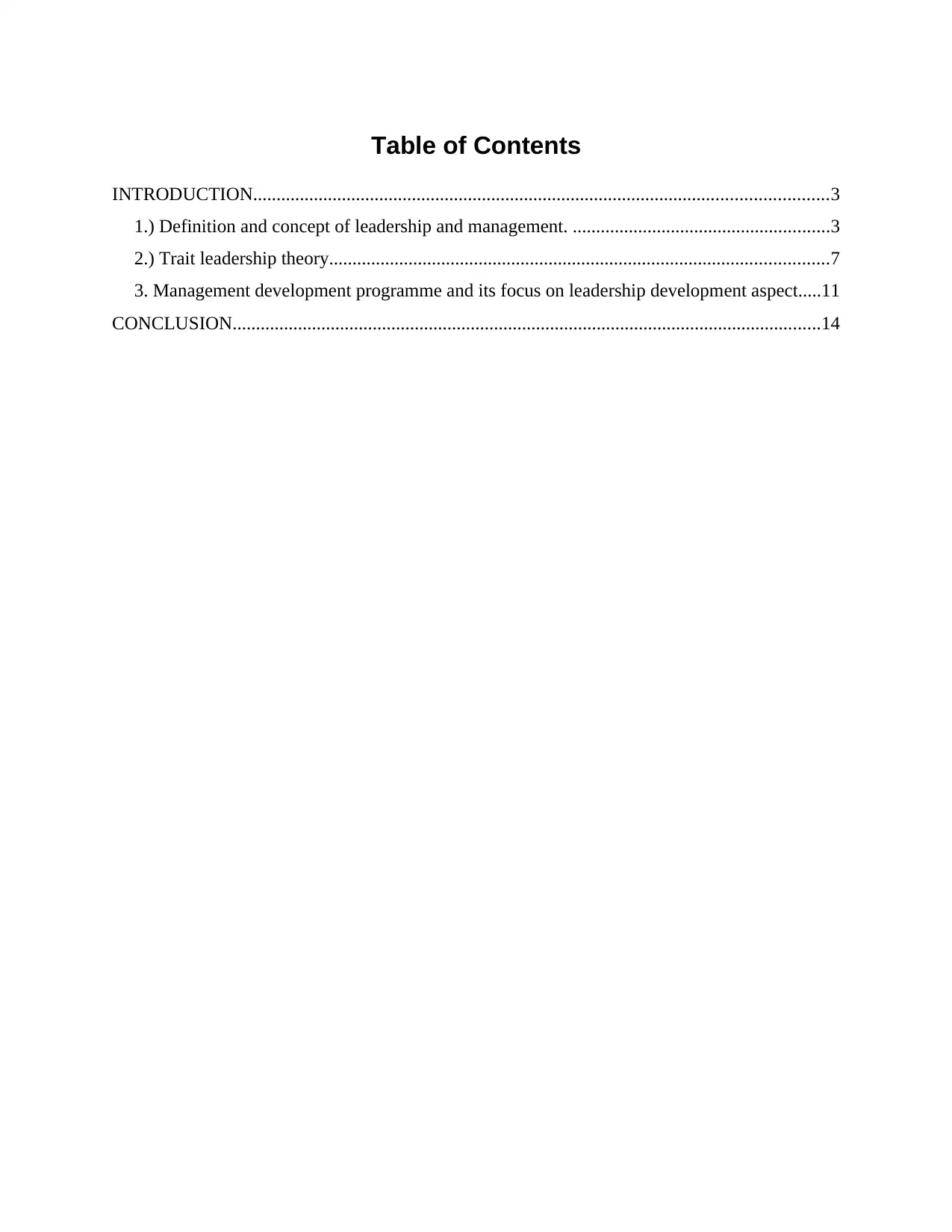
Table of Contents
INTRODUCTION...........................................................................................................................3
1.) Definition and concept of leadership and management. .......................................................3
2.) Trait leadership theory...........................................................................................................7
3. Management development programme and its focus on leadership development aspect.....11
CONCLUSION..............................................................................................................................14
INTRODUCTION...........................................................................................................................3
1.) Definition and concept of leadership and management. .......................................................3
2.) Trait leadership theory...........................................................................................................7
3. Management development programme and its focus on leadership development aspect.....11
CONCLUSION..............................................................................................................................14
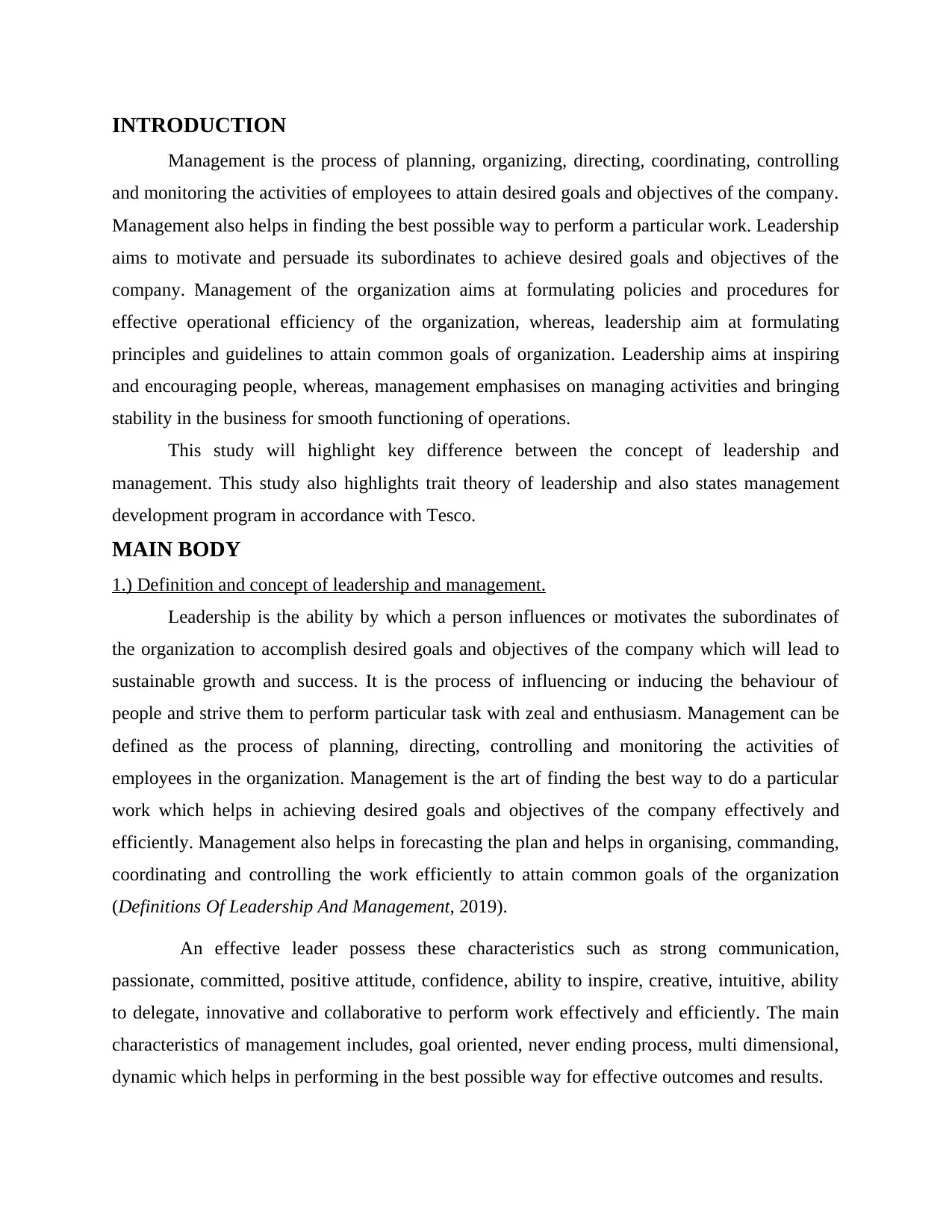
INTRODUCTION
Management is the process of planning, organizing, directing, coordinating, controlling
and monitoring the activities of employees to attain desired goals and objectives of the company.
Management also helps in finding the best possible way to perform a particular work. Leadership
aims to motivate and persuade its subordinates to achieve desired goals and objectives of the
company. Management of the organization aims at formulating policies and procedures for
effective operational efficiency of the organization, whereas, leadership aim at formulating
principles and guidelines to attain common goals of organization. Leadership aims at inspiring
and encouraging people, whereas, management emphasises on managing activities and bringing
stability in the business for smooth functioning of operations.
This study will highlight key difference between the concept of leadership and
management. This study also highlights trait theory of leadership and also states management
development program in accordance with Tesco.
MAIN BODY
1.) Definition and concept of leadership and management.
Leadership is the ability by which a person influences or motivates the subordinates of
the organization to accomplish desired goals and objectives of the company which will lead to
sustainable growth and success. It is the process of influencing or inducing the behaviour of
people and strive them to perform particular task with zeal and enthusiasm. Management can be
defined as the process of planning, directing, controlling and monitoring the activities of
employees in the organization. Management is the art of finding the best way to do a particular
work which helps in achieving desired goals and objectives of the company effectively and
efficiently. Management also helps in forecasting the plan and helps in organising, commanding,
coordinating and controlling the work efficiently to attain common goals of the organization
(Definitions Of Leadership And Management, 2019).
An effective leader possess these characteristics such as strong communication,
passionate, committed, positive attitude, confidence, ability to inspire, creative, intuitive, ability
to delegate, innovative and collaborative to perform work effectively and efficiently. The main
characteristics of management includes, goal oriented, never ending process, multi dimensional,
dynamic which helps in performing in the best possible way for effective outcomes and results.
Management is the process of planning, organizing, directing, coordinating, controlling
and monitoring the activities of employees to attain desired goals and objectives of the company.
Management also helps in finding the best possible way to perform a particular work. Leadership
aims to motivate and persuade its subordinates to achieve desired goals and objectives of the
company. Management of the organization aims at formulating policies and procedures for
effective operational efficiency of the organization, whereas, leadership aim at formulating
principles and guidelines to attain common goals of organization. Leadership aims at inspiring
and encouraging people, whereas, management emphasises on managing activities and bringing
stability in the business for smooth functioning of operations.
This study will highlight key difference between the concept of leadership and
management. This study also highlights trait theory of leadership and also states management
development program in accordance with Tesco.
MAIN BODY
1.) Definition and concept of leadership and management.
Leadership is the ability by which a person influences or motivates the subordinates of
the organization to accomplish desired goals and objectives of the company which will lead to
sustainable growth and success. It is the process of influencing or inducing the behaviour of
people and strive them to perform particular task with zeal and enthusiasm. Management can be
defined as the process of planning, directing, controlling and monitoring the activities of
employees in the organization. Management is the art of finding the best way to do a particular
work which helps in achieving desired goals and objectives of the company effectively and
efficiently. Management also helps in forecasting the plan and helps in organising, commanding,
coordinating and controlling the work efficiently to attain common goals of the organization
(Definitions Of Leadership And Management, 2019).
An effective leader possess these characteristics such as strong communication,
passionate, committed, positive attitude, confidence, ability to inspire, creative, intuitive, ability
to delegate, innovative and collaborative to perform work effectively and efficiently. The main
characteristics of management includes, goal oriented, never ending process, multi dimensional,
dynamic which helps in performing in the best possible way for effective outcomes and results.
⊘ This is a preview!⊘
Do you want full access?
Subscribe today to unlock all pages.

Trusted by 1+ million students worldwide
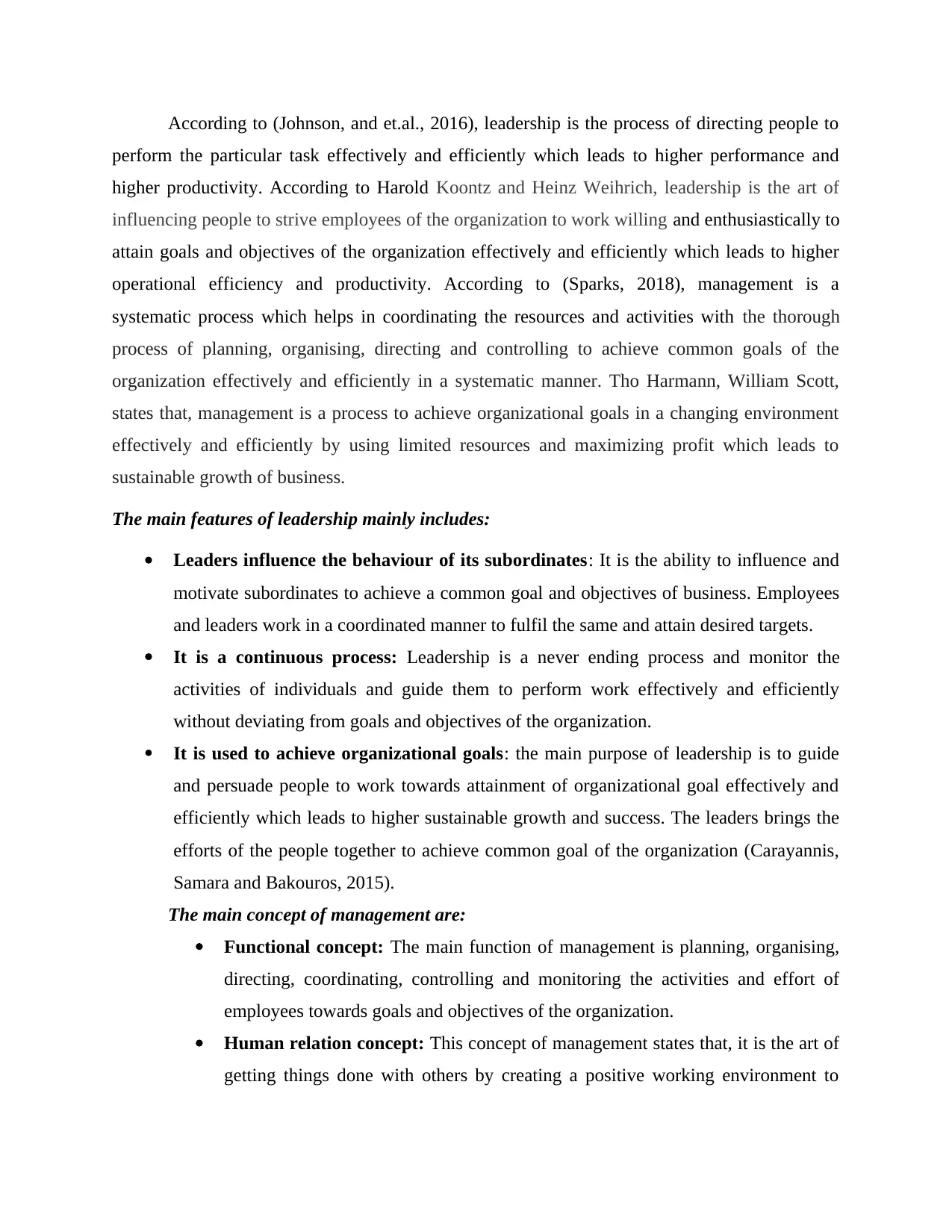
According to (Johnson, and et.al., 2016), leadership is the process of directing people to
perform the particular task effectively and efficiently which leads to higher performance and
higher productivity. According to Harold Koontz and Heinz Weihrich, leadership is the art of
influencing people to strive employees of the organization to work willing and enthusiastically to
attain goals and objectives of the organization effectively and efficiently which leads to higher
operational efficiency and productivity. According to (Sparks, 2018), management is a
systematic process which helps in coordinating the resources and activities with the thorough
process of planning, organising, directing and controlling to achieve common goals of the
organization effectively and efficiently in a systematic manner. Tho Harmann, William Scott,
states that, management is a process to achieve organizational goals in a changing environment
effectively and efficiently by using limited resources and maximizing profit which leads to
sustainable growth of business.
The main features of leadership mainly includes:
Leaders influence the behaviour of its subordinates: It is the ability to influence and
motivate subordinates to achieve a common goal and objectives of business. Employees
and leaders work in a coordinated manner to fulfil the same and attain desired targets.
It is a continuous process: Leadership is a never ending process and monitor the
activities of individuals and guide them to perform work effectively and efficiently
without deviating from goals and objectives of the organization.
It is used to achieve organizational goals: the main purpose of leadership is to guide
and persuade people to work towards attainment of organizational goal effectively and
efficiently which leads to higher sustainable growth and success. The leaders brings the
efforts of the people together to achieve common goal of the organization (Carayannis,
Samara and Bakouros, 2015).
The main concept of management are:
Functional concept: The main function of management is planning, organising,
directing, coordinating, controlling and monitoring the activities and effort of
employees towards goals and objectives of the organization.
Human relation concept: This concept of management states that, it is the art of
getting things done with others by creating a positive working environment to
perform the particular task effectively and efficiently which leads to higher performance and
higher productivity. According to Harold Koontz and Heinz Weihrich, leadership is the art of
influencing people to strive employees of the organization to work willing and enthusiastically to
attain goals and objectives of the organization effectively and efficiently which leads to higher
operational efficiency and productivity. According to (Sparks, 2018), management is a
systematic process which helps in coordinating the resources and activities with the thorough
process of planning, organising, directing and controlling to achieve common goals of the
organization effectively and efficiently in a systematic manner. Tho Harmann, William Scott,
states that, management is a process to achieve organizational goals in a changing environment
effectively and efficiently by using limited resources and maximizing profit which leads to
sustainable growth of business.
The main features of leadership mainly includes:
Leaders influence the behaviour of its subordinates: It is the ability to influence and
motivate subordinates to achieve a common goal and objectives of business. Employees
and leaders work in a coordinated manner to fulfil the same and attain desired targets.
It is a continuous process: Leadership is a never ending process and monitor the
activities of individuals and guide them to perform work effectively and efficiently
without deviating from goals and objectives of the organization.
It is used to achieve organizational goals: the main purpose of leadership is to guide
and persuade people to work towards attainment of organizational goal effectively and
efficiently which leads to higher sustainable growth and success. The leaders brings the
efforts of the people together to achieve common goal of the organization (Carayannis,
Samara and Bakouros, 2015).
The main concept of management are:
Functional concept: The main function of management is planning, organising,
directing, coordinating, controlling and monitoring the activities and effort of
employees towards goals and objectives of the organization.
Human relation concept: This concept of management states that, it is the art of
getting things done with others by creating a positive working environment to
Paraphrase This Document
Need a fresh take? Get an instant paraphrase of this document with our AI Paraphraser
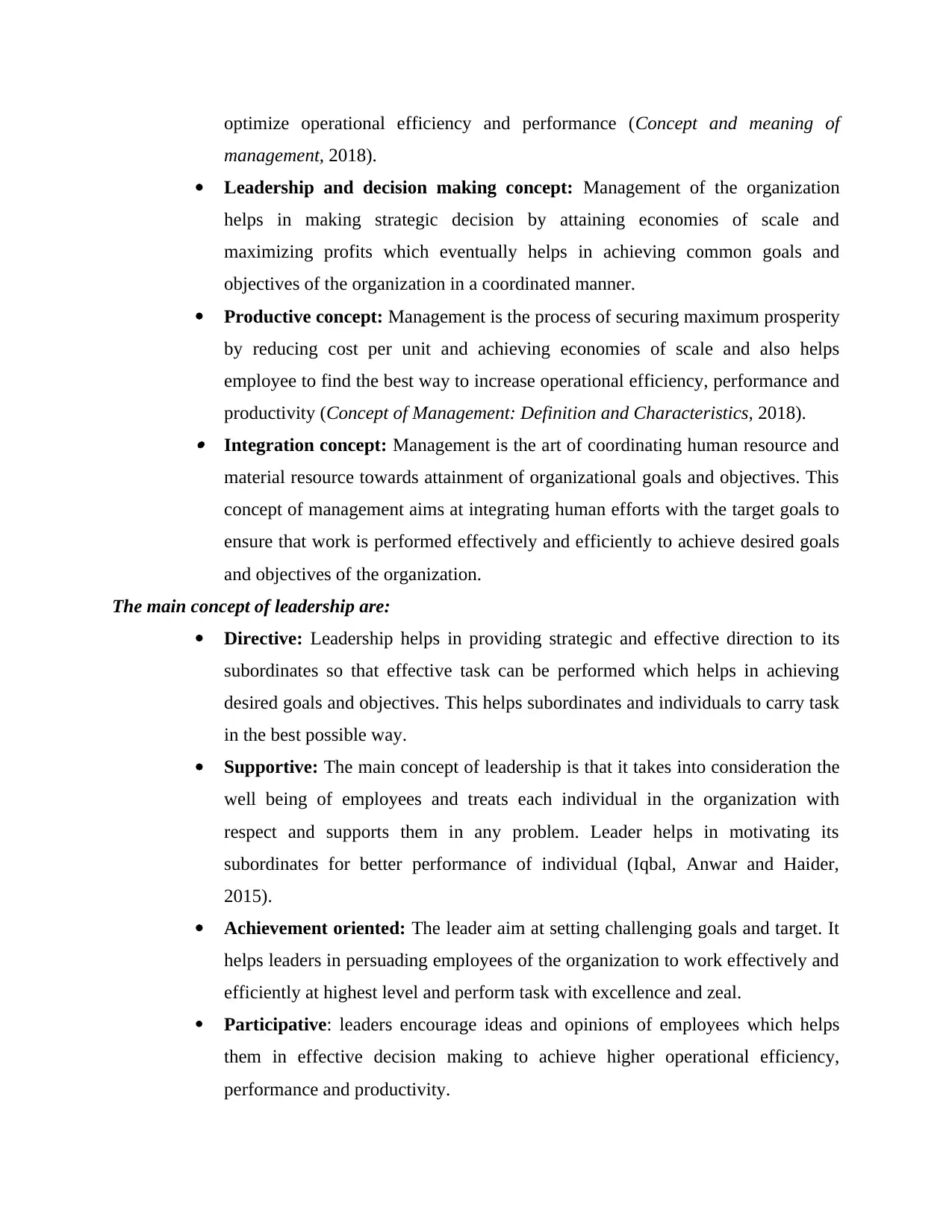
optimize operational efficiency and performance (Concept and meaning of
management, 2018).
Leadership and decision making concept: Management of the organization
helps in making strategic decision by attaining economies of scale and
maximizing profits which eventually helps in achieving common goals and
objectives of the organization in a coordinated manner.
Productive concept: Management is the process of securing maximum prosperity
by reducing cost per unit and achieving economies of scale and also helps
employee to find the best way to increase operational efficiency, performance and
productivity (Concept of Management: Definition and Characteristics, 2018).
Integration concept: Management is the art of coordinating human resource and
material resource towards attainment of organizational goals and objectives. This
concept of management aims at integrating human efforts with the target goals to
ensure that work is performed effectively and efficiently to achieve desired goals
and objectives of the organization.
The main concept of leadership are:
Directive: Leadership helps in providing strategic and effective direction to its
subordinates so that effective task can be performed which helps in achieving
desired goals and objectives. This helps subordinates and individuals to carry task
in the best possible way.
Supportive: The main concept of leadership is that it takes into consideration the
well being of employees and treats each individual in the organization with
respect and supports them in any problem. Leader helps in motivating its
subordinates for better performance of individual (Iqbal, Anwar and Haider,
2015).
Achievement oriented: The leader aim at setting challenging goals and target. It
helps leaders in persuading employees of the organization to work effectively and
efficiently at highest level and perform task with excellence and zeal.
Participative: leaders encourage ideas and opinions of employees which helps
them in effective decision making to achieve higher operational efficiency,
performance and productivity.
management, 2018).
Leadership and decision making concept: Management of the organization
helps in making strategic decision by attaining economies of scale and
maximizing profits which eventually helps in achieving common goals and
objectives of the organization in a coordinated manner.
Productive concept: Management is the process of securing maximum prosperity
by reducing cost per unit and achieving economies of scale and also helps
employee to find the best way to increase operational efficiency, performance and
productivity (Concept of Management: Definition and Characteristics, 2018).
Integration concept: Management is the art of coordinating human resource and
material resource towards attainment of organizational goals and objectives. This
concept of management aims at integrating human efforts with the target goals to
ensure that work is performed effectively and efficiently to achieve desired goals
and objectives of the organization.
The main concept of leadership are:
Directive: Leadership helps in providing strategic and effective direction to its
subordinates so that effective task can be performed which helps in achieving
desired goals and objectives. This helps subordinates and individuals to carry task
in the best possible way.
Supportive: The main concept of leadership is that it takes into consideration the
well being of employees and treats each individual in the organization with
respect and supports them in any problem. Leader helps in motivating its
subordinates for better performance of individual (Iqbal, Anwar and Haider,
2015).
Achievement oriented: The leader aim at setting challenging goals and target. It
helps leaders in persuading employees of the organization to work effectively and
efficiently at highest level and perform task with excellence and zeal.
Participative: leaders encourage ideas and opinions of employees which helps
them in effective decision making to achieve higher operational efficiency,
performance and productivity.
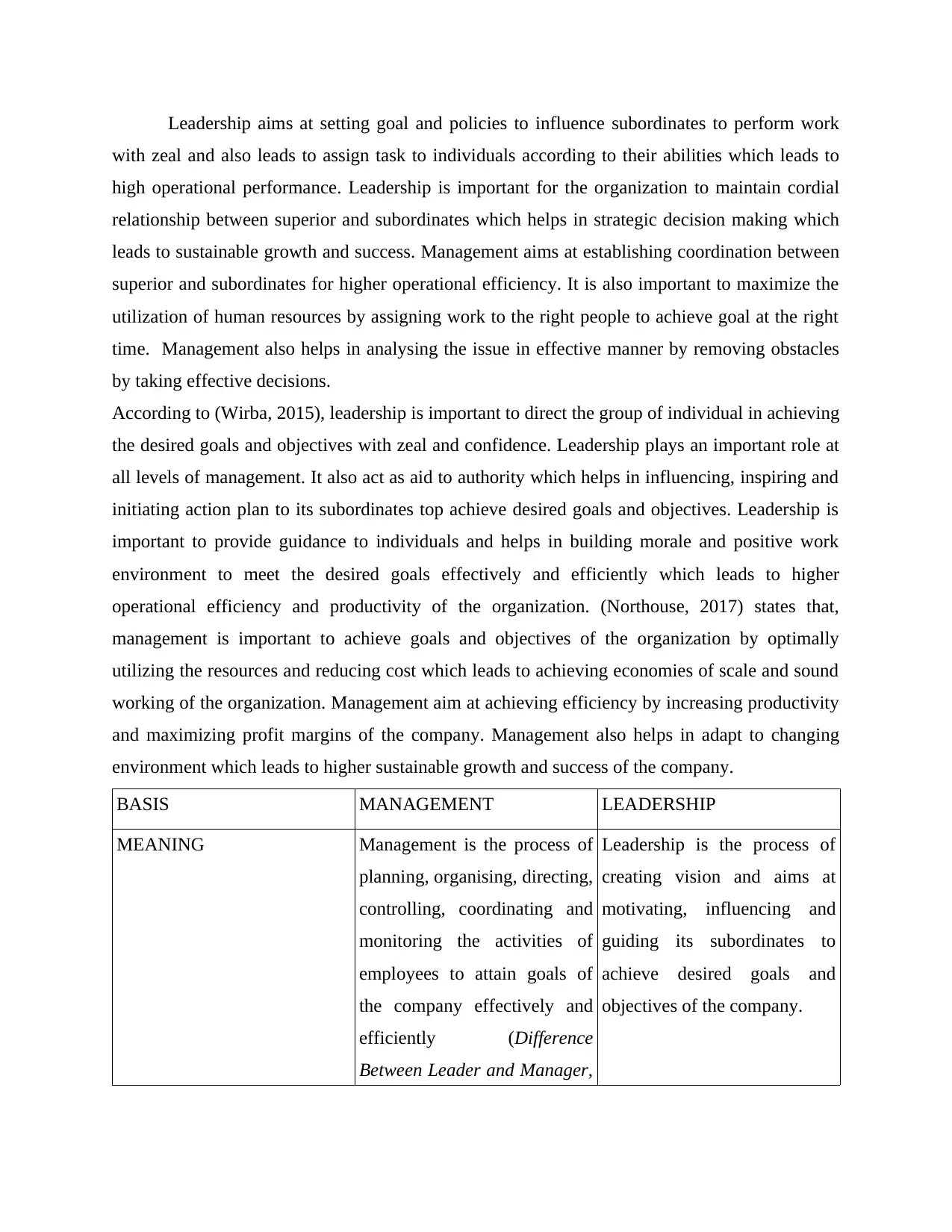
Leadership aims at setting goal and policies to influence subordinates to perform work
with zeal and also leads to assign task to individuals according to their abilities which leads to
high operational performance. Leadership is important for the organization to maintain cordial
relationship between superior and subordinates which helps in strategic decision making which
leads to sustainable growth and success. Management aims at establishing coordination between
superior and subordinates for higher operational efficiency. It is also important to maximize the
utilization of human resources by assigning work to the right people to achieve goal at the right
time. Management also helps in analysing the issue in effective manner by removing obstacles
by taking effective decisions.
According to (Wirba, 2015), leadership is important to direct the group of individual in achieving
the desired goals and objectives with zeal and confidence. Leadership plays an important role at
all levels of management. It also act as aid to authority which helps in influencing, inspiring and
initiating action plan to its subordinates top achieve desired goals and objectives. Leadership is
important to provide guidance to individuals and helps in building morale and positive work
environment to meet the desired goals effectively and efficiently which leads to higher
operational efficiency and productivity of the organization. (Northouse, 2017) states that,
management is important to achieve goals and objectives of the organization by optimally
utilizing the resources and reducing cost which leads to achieving economies of scale and sound
working of the organization. Management aim at achieving efficiency by increasing productivity
and maximizing profit margins of the company. Management also helps in adapt to changing
environment which leads to higher sustainable growth and success of the company.
BASIS MANAGEMENT LEADERSHIP
MEANING Management is the process of
planning, organising, directing,
controlling, coordinating and
monitoring the activities of
employees to attain goals of
the company effectively and
efficiently (Difference
Between Leader and Manager,
Leadership is the process of
creating vision and aims at
motivating, influencing and
guiding its subordinates to
achieve desired goals and
objectives of the company.
with zeal and also leads to assign task to individuals according to their abilities which leads to
high operational performance. Leadership is important for the organization to maintain cordial
relationship between superior and subordinates which helps in strategic decision making which
leads to sustainable growth and success. Management aims at establishing coordination between
superior and subordinates for higher operational efficiency. It is also important to maximize the
utilization of human resources by assigning work to the right people to achieve goal at the right
time. Management also helps in analysing the issue in effective manner by removing obstacles
by taking effective decisions.
According to (Wirba, 2015), leadership is important to direct the group of individual in achieving
the desired goals and objectives with zeal and confidence. Leadership plays an important role at
all levels of management. It also act as aid to authority which helps in influencing, inspiring and
initiating action plan to its subordinates top achieve desired goals and objectives. Leadership is
important to provide guidance to individuals and helps in building morale and positive work
environment to meet the desired goals effectively and efficiently which leads to higher
operational efficiency and productivity of the organization. (Northouse, 2017) states that,
management is important to achieve goals and objectives of the organization by optimally
utilizing the resources and reducing cost which leads to achieving economies of scale and sound
working of the organization. Management aim at achieving efficiency by increasing productivity
and maximizing profit margins of the company. Management also helps in adapt to changing
environment which leads to higher sustainable growth and success of the company.
BASIS MANAGEMENT LEADERSHIP
MEANING Management is the process of
planning, organising, directing,
controlling, coordinating and
monitoring the activities of
employees to attain goals of
the company effectively and
efficiently (Difference
Between Leader and Manager,
Leadership is the process of
creating vision and aims at
motivating, influencing and
guiding its subordinates to
achieve desired goals and
objectives of the company.
⊘ This is a preview!⊘
Do you want full access?
Subscribe today to unlock all pages.

Trusted by 1+ million students worldwide
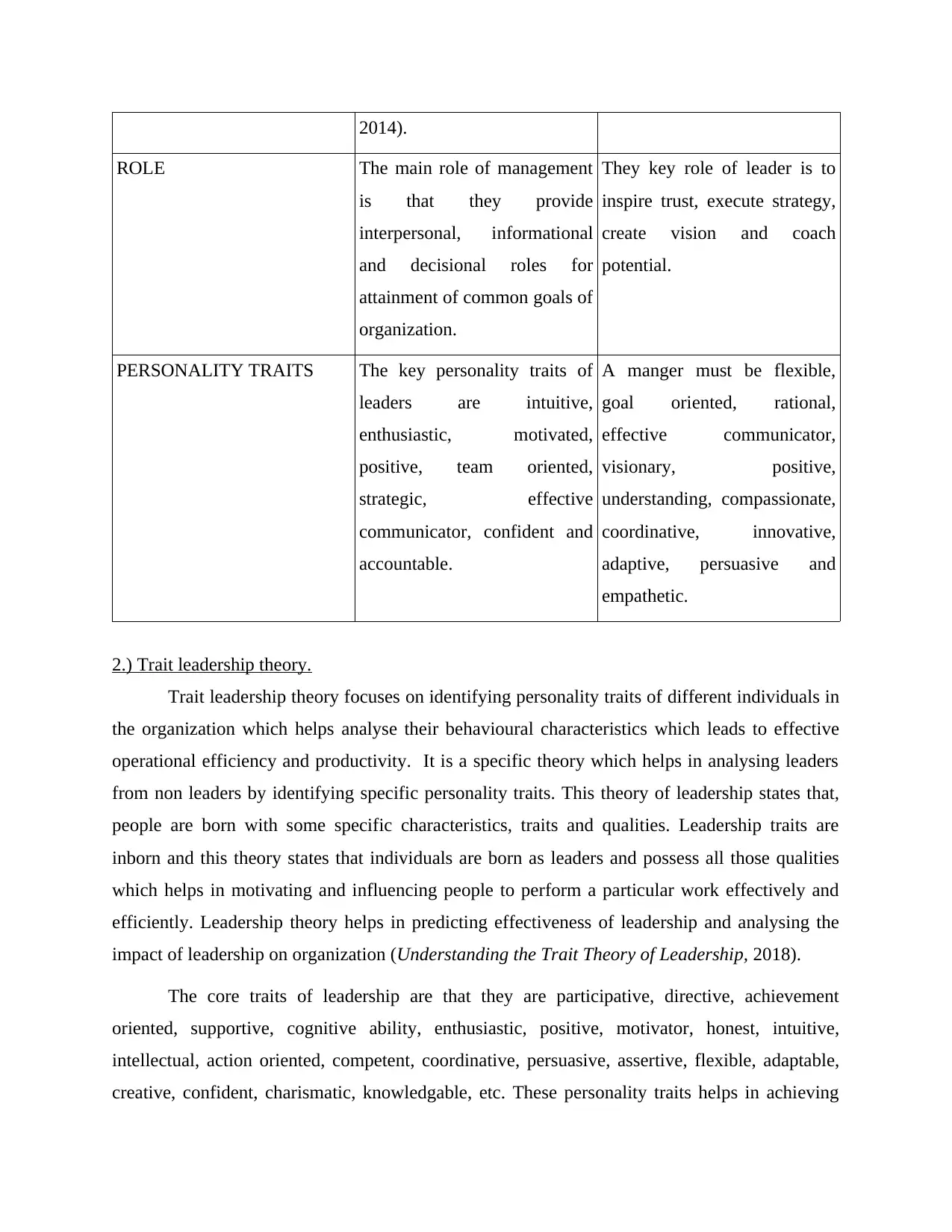
2014).
ROLE The main role of management
is that they provide
interpersonal, informational
and decisional roles for
attainment of common goals of
organization.
They key role of leader is to
inspire trust, execute strategy,
create vision and coach
potential.
PERSONALITY TRAITS The key personality traits of
leaders are intuitive,
enthusiastic, motivated,
positive, team oriented,
strategic, effective
communicator, confident and
accountable.
A manger must be flexible,
goal oriented, rational,
effective communicator,
visionary, positive,
understanding, compassionate,
coordinative, innovative,
adaptive, persuasive and
empathetic.
2.) Trait leadership theory.
Trait leadership theory focuses on identifying personality traits of different individuals in
the organization which helps analyse their behavioural characteristics which leads to effective
operational efficiency and productivity. It is a specific theory which helps in analysing leaders
from non leaders by identifying specific personality traits. This theory of leadership states that,
people are born with some specific characteristics, traits and qualities. Leadership traits are
inborn and this theory states that individuals are born as leaders and possess all those qualities
which helps in motivating and influencing people to perform a particular work effectively and
efficiently. Leadership theory helps in predicting effectiveness of leadership and analysing the
impact of leadership on organization (Understanding the Trait Theory of Leadership, 2018).
The core traits of leadership are that they are participative, directive, achievement
oriented, supportive, cognitive ability, enthusiastic, positive, motivator, honest, intuitive,
intellectual, action oriented, competent, coordinative, persuasive, assertive, flexible, adaptable,
creative, confident, charismatic, knowledgable, etc. These personality traits helps in achieving
ROLE The main role of management
is that they provide
interpersonal, informational
and decisional roles for
attainment of common goals of
organization.
They key role of leader is to
inspire trust, execute strategy,
create vision and coach
potential.
PERSONALITY TRAITS The key personality traits of
leaders are intuitive,
enthusiastic, motivated,
positive, team oriented,
strategic, effective
communicator, confident and
accountable.
A manger must be flexible,
goal oriented, rational,
effective communicator,
visionary, positive,
understanding, compassionate,
coordinative, innovative,
adaptive, persuasive and
empathetic.
2.) Trait leadership theory.
Trait leadership theory focuses on identifying personality traits of different individuals in
the organization which helps analyse their behavioural characteristics which leads to effective
operational efficiency and productivity. It is a specific theory which helps in analysing leaders
from non leaders by identifying specific personality traits. This theory of leadership states that,
people are born with some specific characteristics, traits and qualities. Leadership traits are
inborn and this theory states that individuals are born as leaders and possess all those qualities
which helps in motivating and influencing people to perform a particular work effectively and
efficiently. Leadership theory helps in predicting effectiveness of leadership and analysing the
impact of leadership on organization (Understanding the Trait Theory of Leadership, 2018).
The core traits of leadership are that they are participative, directive, achievement
oriented, supportive, cognitive ability, enthusiastic, positive, motivator, honest, intuitive,
intellectual, action oriented, competent, coordinative, persuasive, assertive, flexible, adaptable,
creative, confident, charismatic, knowledgable, etc. These personality traits helps in achieving
Paraphrase This Document
Need a fresh take? Get an instant paraphrase of this document with our AI Paraphraser
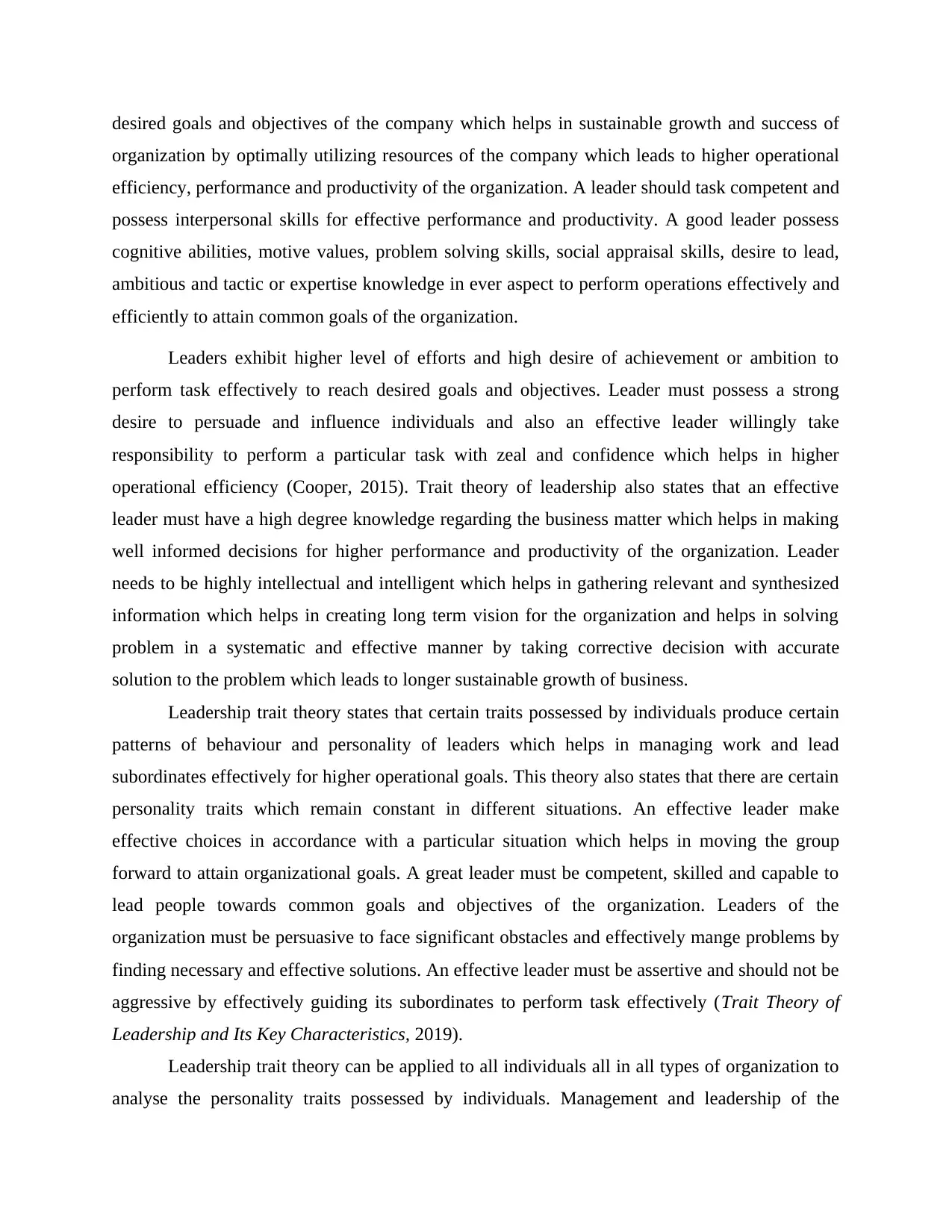
desired goals and objectives of the company which helps in sustainable growth and success of
organization by optimally utilizing resources of the company which leads to higher operational
efficiency, performance and productivity of the organization. A leader should task competent and
possess interpersonal skills for effective performance and productivity. A good leader possess
cognitive abilities, motive values, problem solving skills, social appraisal skills, desire to lead,
ambitious and tactic or expertise knowledge in ever aspect to perform operations effectively and
efficiently to attain common goals of the organization.
Leaders exhibit higher level of efforts and high desire of achievement or ambition to
perform task effectively to reach desired goals and objectives. Leader must possess a strong
desire to persuade and influence individuals and also an effective leader willingly take
responsibility to perform a particular task with zeal and confidence which helps in higher
operational efficiency (Cooper, 2015). Trait theory of leadership also states that an effective
leader must have a high degree knowledge regarding the business matter which helps in making
well informed decisions for higher performance and productivity of the organization. Leader
needs to be highly intellectual and intelligent which helps in gathering relevant and synthesized
information which helps in creating long term vision for the organization and helps in solving
problem in a systematic and effective manner by taking corrective decision with accurate
solution to the problem which leads to longer sustainable growth of business.
Leadership trait theory states that certain traits possessed by individuals produce certain
patterns of behaviour and personality of leaders which helps in managing work and lead
subordinates effectively for higher operational goals. This theory also states that there are certain
personality traits which remain constant in different situations. An effective leader make
effective choices in accordance with a particular situation which helps in moving the group
forward to attain organizational goals. A great leader must be competent, skilled and capable to
lead people towards common goals and objectives of the organization. Leaders of the
organization must be persuasive to face significant obstacles and effectively mange problems by
finding necessary and effective solutions. An effective leader must be assertive and should not be
aggressive by effectively guiding its subordinates to perform task effectively (Trait Theory of
Leadership and Its Key Characteristics, 2019).
Leadership trait theory can be applied to all individuals all in all types of organization to
analyse the personality traits possessed by individuals. Management and leadership of the
organization by optimally utilizing resources of the company which leads to higher operational
efficiency, performance and productivity of the organization. A leader should task competent and
possess interpersonal skills for effective performance and productivity. A good leader possess
cognitive abilities, motive values, problem solving skills, social appraisal skills, desire to lead,
ambitious and tactic or expertise knowledge in ever aspect to perform operations effectively and
efficiently to attain common goals of the organization.
Leaders exhibit higher level of efforts and high desire of achievement or ambition to
perform task effectively to reach desired goals and objectives. Leader must possess a strong
desire to persuade and influence individuals and also an effective leader willingly take
responsibility to perform a particular task with zeal and confidence which helps in higher
operational efficiency (Cooper, 2015). Trait theory of leadership also states that an effective
leader must have a high degree knowledge regarding the business matter which helps in making
well informed decisions for higher performance and productivity of the organization. Leader
needs to be highly intellectual and intelligent which helps in gathering relevant and synthesized
information which helps in creating long term vision for the organization and helps in solving
problem in a systematic and effective manner by taking corrective decision with accurate
solution to the problem which leads to longer sustainable growth of business.
Leadership trait theory states that certain traits possessed by individuals produce certain
patterns of behaviour and personality of leaders which helps in managing work and lead
subordinates effectively for higher operational goals. This theory also states that there are certain
personality traits which remain constant in different situations. An effective leader make
effective choices in accordance with a particular situation which helps in moving the group
forward to attain organizational goals. A great leader must be competent, skilled and capable to
lead people towards common goals and objectives of the organization. Leaders of the
organization must be persuasive to face significant obstacles and effectively mange problems by
finding necessary and effective solutions. An effective leader must be assertive and should not be
aggressive by effectively guiding its subordinates to perform task effectively (Trait Theory of
Leadership and Its Key Characteristics, 2019).
Leadership trait theory can be applied to all individuals all in all types of organization to
analyse the personality traits possessed by individuals. Management and leadership of the
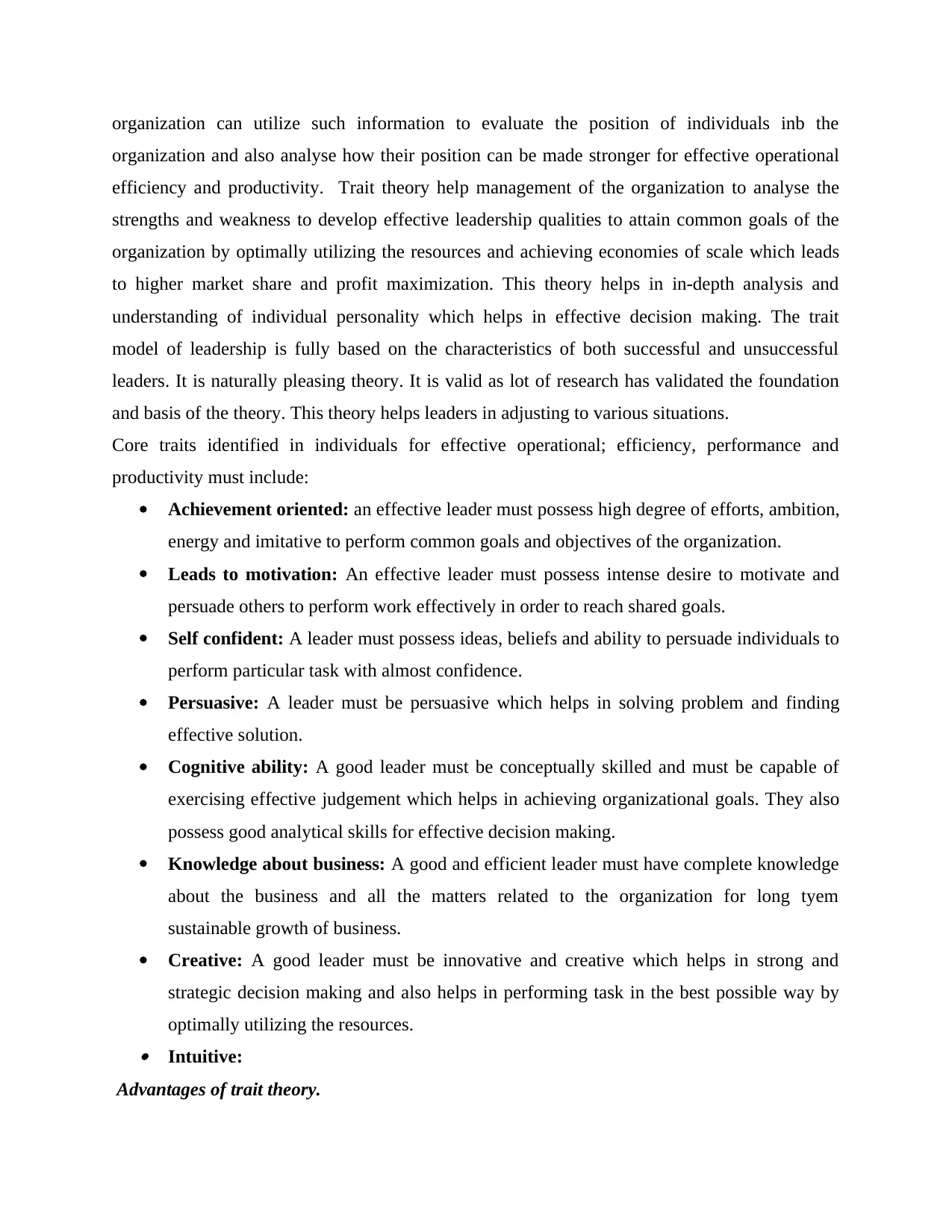
organization can utilize such information to evaluate the position of individuals inb the
organization and also analyse how their position can be made stronger for effective operational
efficiency and productivity. Trait theory help management of the organization to analyse the
strengths and weakness to develop effective leadership qualities to attain common goals of the
organization by optimally utilizing the resources and achieving economies of scale which leads
to higher market share and profit maximization. This theory helps in in-depth analysis and
understanding of individual personality which helps in effective decision making. The trait
model of leadership is fully based on the characteristics of both successful and unsuccessful
leaders. It is naturally pleasing theory. It is valid as lot of research has validated the foundation
and basis of the theory. This theory helps leaders in adjusting to various situations.
Core traits identified in individuals for effective operational; efficiency, performance and
productivity must include:
Achievement oriented: an effective leader must possess high degree of efforts, ambition,
energy and imitative to perform common goals and objectives of the organization.
Leads to motivation: An effective leader must possess intense desire to motivate and
persuade others to perform work effectively in order to reach shared goals.
Self confident: A leader must possess ideas, beliefs and ability to persuade individuals to
perform particular task with almost confidence.
Persuasive: A leader must be persuasive which helps in solving problem and finding
effective solution.
Cognitive ability: A good leader must be conceptually skilled and must be capable of
exercising effective judgement which helps in achieving organizational goals. They also
possess good analytical skills for effective decision making.
Knowledge about business: A good and efficient leader must have complete knowledge
about the business and all the matters related to the organization for long tyem
sustainable growth of business.
Creative: A good leader must be innovative and creative which helps in strong and
strategic decision making and also helps in performing task in the best possible way by
optimally utilizing the resources. Intuitive:
Advantages of trait theory.
organization and also analyse how their position can be made stronger for effective operational
efficiency and productivity. Trait theory help management of the organization to analyse the
strengths and weakness to develop effective leadership qualities to attain common goals of the
organization by optimally utilizing the resources and achieving economies of scale which leads
to higher market share and profit maximization. This theory helps in in-depth analysis and
understanding of individual personality which helps in effective decision making. The trait
model of leadership is fully based on the characteristics of both successful and unsuccessful
leaders. It is naturally pleasing theory. It is valid as lot of research has validated the foundation
and basis of the theory. This theory helps leaders in adjusting to various situations.
Core traits identified in individuals for effective operational; efficiency, performance and
productivity must include:
Achievement oriented: an effective leader must possess high degree of efforts, ambition,
energy and imitative to perform common goals and objectives of the organization.
Leads to motivation: An effective leader must possess intense desire to motivate and
persuade others to perform work effectively in order to reach shared goals.
Self confident: A leader must possess ideas, beliefs and ability to persuade individuals to
perform particular task with almost confidence.
Persuasive: A leader must be persuasive which helps in solving problem and finding
effective solution.
Cognitive ability: A good leader must be conceptually skilled and must be capable of
exercising effective judgement which helps in achieving organizational goals. They also
possess good analytical skills for effective decision making.
Knowledge about business: A good and efficient leader must have complete knowledge
about the business and all the matters related to the organization for long tyem
sustainable growth of business.
Creative: A good leader must be innovative and creative which helps in strong and
strategic decision making and also helps in performing task in the best possible way by
optimally utilizing the resources. Intuitive:
Advantages of trait theory.
⊘ This is a preview!⊘
Do you want full access?
Subscribe today to unlock all pages.

Trusted by 1+ million students worldwide
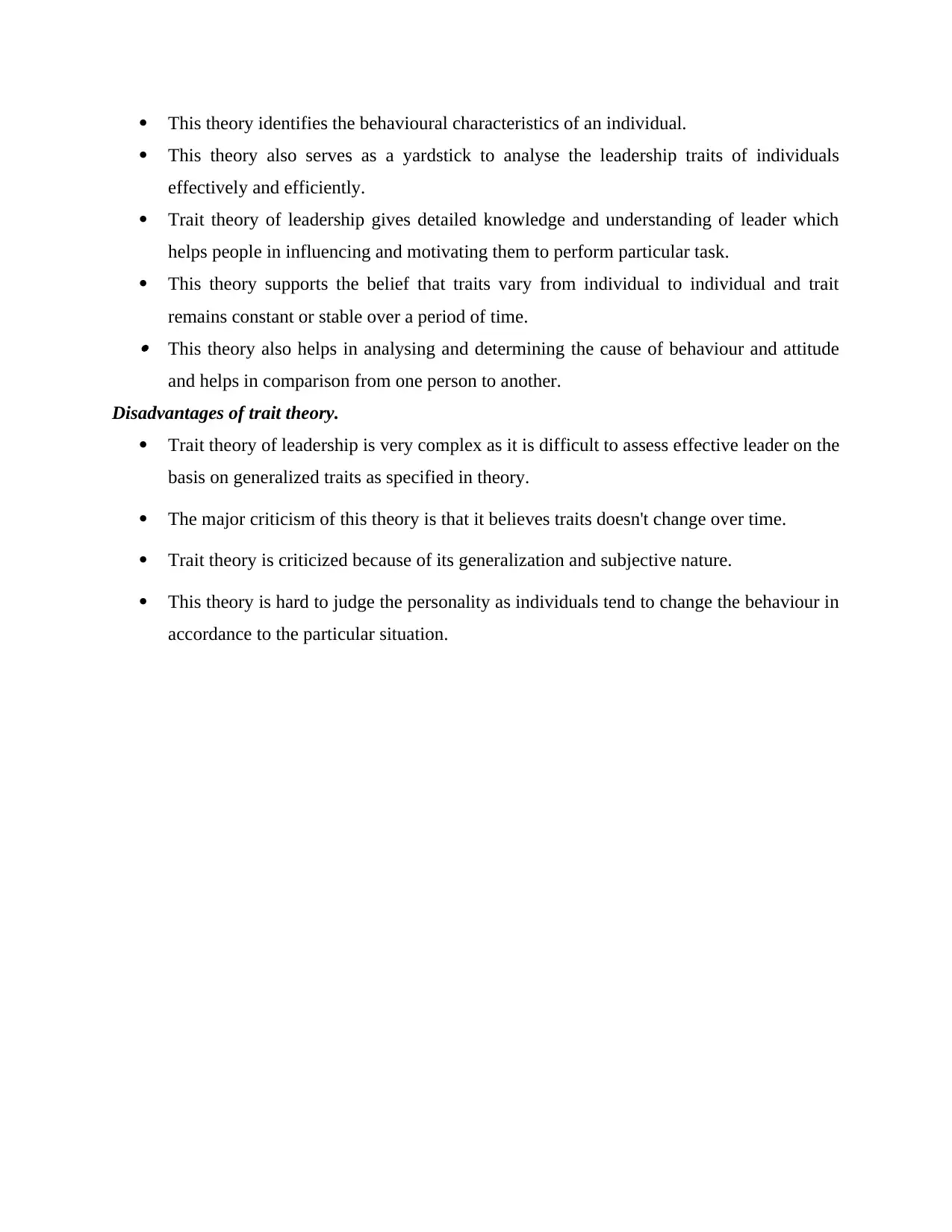
This theory identifies the behavioural characteristics of an individual.
This theory also serves as a yardstick to analyse the leadership traits of individuals
effectively and efficiently.
Trait theory of leadership gives detailed knowledge and understanding of leader which
helps people in influencing and motivating them to perform particular task.
This theory supports the belief that traits vary from individual to individual and trait
remains constant or stable over a period of time. This theory also helps in analysing and determining the cause of behaviour and attitude
and helps in comparison from one person to another.
Disadvantages of trait theory.
Trait theory of leadership is very complex as it is difficult to assess effective leader on the
basis on generalized traits as specified in theory.
The major criticism of this theory is that it believes traits doesn't change over time.
Trait theory is criticized because of its generalization and subjective nature.
This theory is hard to judge the personality as individuals tend to change the behaviour in
accordance to the particular situation.
This theory also serves as a yardstick to analyse the leadership traits of individuals
effectively and efficiently.
Trait theory of leadership gives detailed knowledge and understanding of leader which
helps people in influencing and motivating them to perform particular task.
This theory supports the belief that traits vary from individual to individual and trait
remains constant or stable over a period of time. This theory also helps in analysing and determining the cause of behaviour and attitude
and helps in comparison from one person to another.
Disadvantages of trait theory.
Trait theory of leadership is very complex as it is difficult to assess effective leader on the
basis on generalized traits as specified in theory.
The major criticism of this theory is that it believes traits doesn't change over time.
Trait theory is criticized because of its generalization and subjective nature.
This theory is hard to judge the personality as individuals tend to change the behaviour in
accordance to the particular situation.
Paraphrase This Document
Need a fresh take? Get an instant paraphrase of this document with our AI Paraphraser
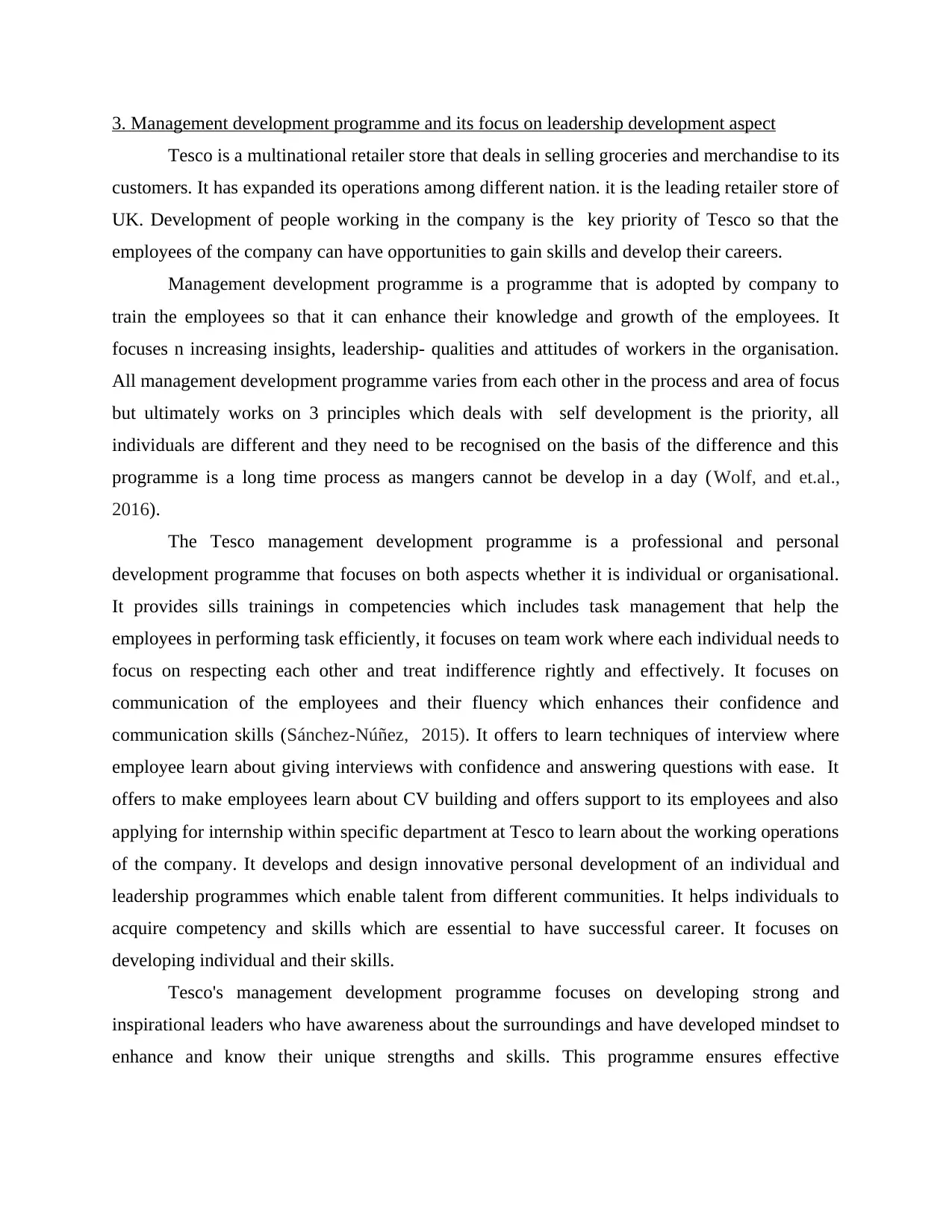
3. Management development programme and its focus on leadership development aspect
Tesco is a multinational retailer store that deals in selling groceries and merchandise to its
customers. It has expanded its operations among different nation. it is the leading retailer store of
UK. Development of people working in the company is the key priority of Tesco so that the
employees of the company can have opportunities to gain skills and develop their careers.
Management development programme is a programme that is adopted by company to
train the employees so that it can enhance their knowledge and growth of the employees. It
focuses n increasing insights, leadership- qualities and attitudes of workers in the organisation.
All management development programme varies from each other in the process and area of focus
but ultimately works on 3 principles which deals with self development is the priority, all
individuals are different and they need to be recognised on the basis of the difference and this
programme is a long time process as mangers cannot be develop in a day (Wolf, and et.al.,
2016).
The Tesco management development programme is a professional and personal
development programme that focuses on both aspects whether it is individual or organisational.
It provides sills trainings in competencies which includes task management that help the
employees in performing task efficiently, it focuses on team work where each individual needs to
focus on respecting each other and treat indifference rightly and effectively. It focuses on
communication of the employees and their fluency which enhances their confidence and
communication skills (Sánchez-Núñez, 2015). It offers to learn techniques of interview where
employee learn about giving interviews with confidence and answering questions with ease. It
offers to make employees learn about CV building and offers support to its employees and also
applying for internship within specific department at Tesco to learn about the working operations
of the company. It develops and design innovative personal development of an individual and
leadership programmes which enable talent from different communities. It helps individuals to
acquire competency and skills which are essential to have successful career. It focuses on
developing individual and their skills.
Tesco's management development programme focuses on developing strong and
inspirational leaders who have awareness about the surroundings and have developed mindset to
enhance and know their unique strengths and skills. This programme ensures effective
Tesco is a multinational retailer store that deals in selling groceries and merchandise to its
customers. It has expanded its operations among different nation. it is the leading retailer store of
UK. Development of people working in the company is the key priority of Tesco so that the
employees of the company can have opportunities to gain skills and develop their careers.
Management development programme is a programme that is adopted by company to
train the employees so that it can enhance their knowledge and growth of the employees. It
focuses n increasing insights, leadership- qualities and attitudes of workers in the organisation.
All management development programme varies from each other in the process and area of focus
but ultimately works on 3 principles which deals with self development is the priority, all
individuals are different and they need to be recognised on the basis of the difference and this
programme is a long time process as mangers cannot be develop in a day (Wolf, and et.al.,
2016).
The Tesco management development programme is a professional and personal
development programme that focuses on both aspects whether it is individual or organisational.
It provides sills trainings in competencies which includes task management that help the
employees in performing task efficiently, it focuses on team work where each individual needs to
focus on respecting each other and treat indifference rightly and effectively. It focuses on
communication of the employees and their fluency which enhances their confidence and
communication skills (Sánchez-Núñez, 2015). It offers to learn techniques of interview where
employee learn about giving interviews with confidence and answering questions with ease. It
offers to make employees learn about CV building and offers support to its employees and also
applying for internship within specific department at Tesco to learn about the working operations
of the company. It develops and design innovative personal development of an individual and
leadership programmes which enable talent from different communities. It helps individuals to
acquire competency and skills which are essential to have successful career. It focuses on
developing individual and their skills.
Tesco's management development programme focuses on developing strong and
inspirational leaders who have awareness about the surroundings and have developed mindset to
enhance and know their unique strengths and skills. This programme ensures effective
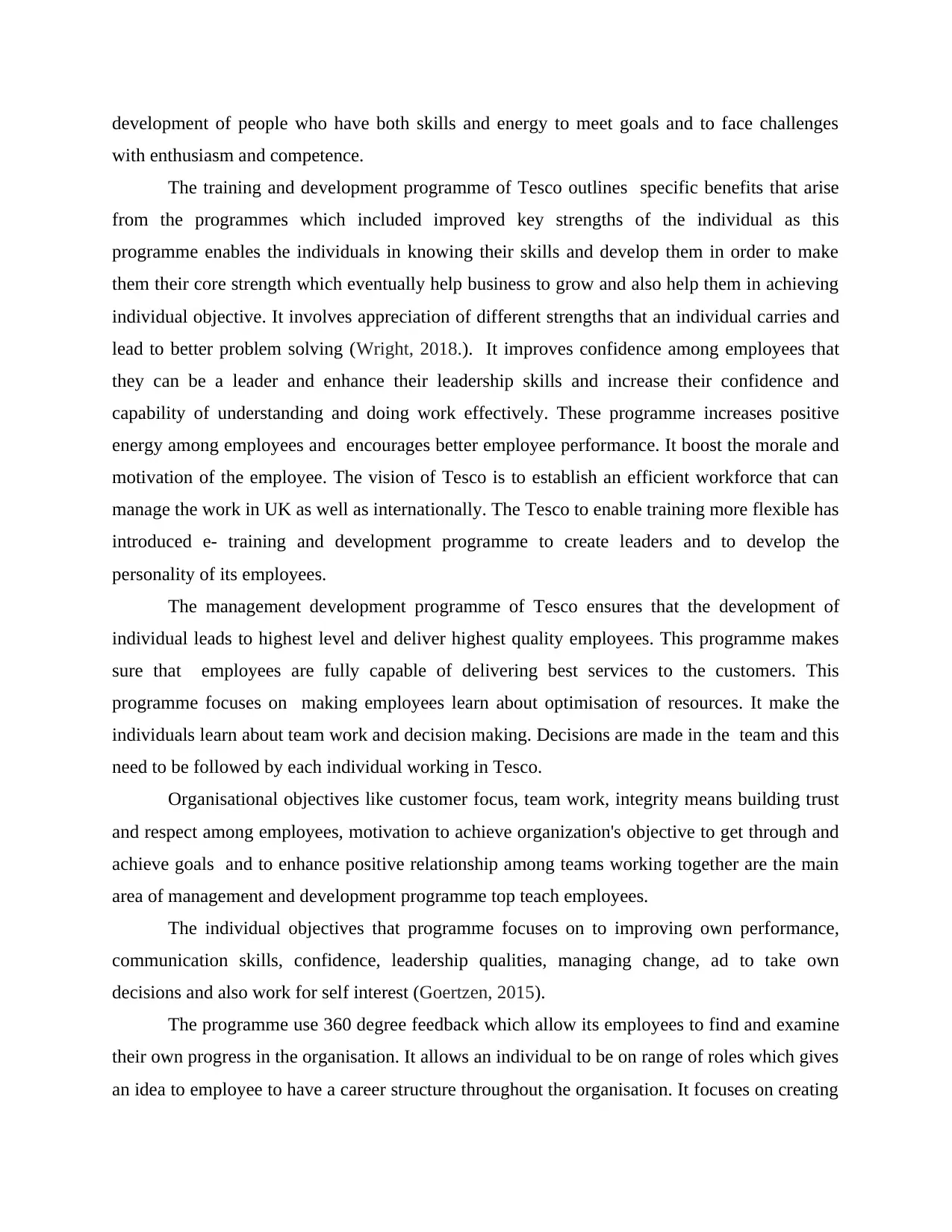
development of people who have both skills and energy to meet goals and to face challenges
with enthusiasm and competence.
The training and development programme of Tesco outlines specific benefits that arise
from the programmes which included improved key strengths of the individual as this
programme enables the individuals in knowing their skills and develop them in order to make
them their core strength which eventually help business to grow and also help them in achieving
individual objective. It involves appreciation of different strengths that an individual carries and
lead to better problem solving (Wright, 2018.). It improves confidence among employees that
they can be a leader and enhance their leadership skills and increase their confidence and
capability of understanding and doing work effectively. These programme increases positive
energy among employees and encourages better employee performance. It boost the morale and
motivation of the employee. The vision of Tesco is to establish an efficient workforce that can
manage the work in UK as well as internationally. The Tesco to enable training more flexible has
introduced e- training and development programme to create leaders and to develop the
personality of its employees.
The management development programme of Tesco ensures that the development of
individual leads to highest level and deliver highest quality employees. This programme makes
sure that employees are fully capable of delivering best services to the customers. This
programme focuses on making employees learn about optimisation of resources. It make the
individuals learn about team work and decision making. Decisions are made in the team and this
need to be followed by each individual working in Tesco.
Organisational objectives like customer focus, team work, integrity means building trust
and respect among employees, motivation to achieve organization's objective to get through and
achieve goals and to enhance positive relationship among teams working together are the main
area of management and development programme top teach employees.
The individual objectives that programme focuses on to improving own performance,
communication skills, confidence, leadership qualities, managing change, ad to take own
decisions and also work for self interest (Goertzen, 2015).
The programme use 360 degree feedback which allow its employees to find and examine
their own progress in the organisation. It allows an individual to be on range of roles which gives
an idea to employee to have a career structure throughout the organisation. It focuses on creating
with enthusiasm and competence.
The training and development programme of Tesco outlines specific benefits that arise
from the programmes which included improved key strengths of the individual as this
programme enables the individuals in knowing their skills and develop them in order to make
them their core strength which eventually help business to grow and also help them in achieving
individual objective. It involves appreciation of different strengths that an individual carries and
lead to better problem solving (Wright, 2018.). It improves confidence among employees that
they can be a leader and enhance their leadership skills and increase their confidence and
capability of understanding and doing work effectively. These programme increases positive
energy among employees and encourages better employee performance. It boost the morale and
motivation of the employee. The vision of Tesco is to establish an efficient workforce that can
manage the work in UK as well as internationally. The Tesco to enable training more flexible has
introduced e- training and development programme to create leaders and to develop the
personality of its employees.
The management development programme of Tesco ensures that the development of
individual leads to highest level and deliver highest quality employees. This programme makes
sure that employees are fully capable of delivering best services to the customers. This
programme focuses on making employees learn about optimisation of resources. It make the
individuals learn about team work and decision making. Decisions are made in the team and this
need to be followed by each individual working in Tesco.
Organisational objectives like customer focus, team work, integrity means building trust
and respect among employees, motivation to achieve organization's objective to get through and
achieve goals and to enhance positive relationship among teams working together are the main
area of management and development programme top teach employees.
The individual objectives that programme focuses on to improving own performance,
communication skills, confidence, leadership qualities, managing change, ad to take own
decisions and also work for self interest (Goertzen, 2015).
The programme use 360 degree feedback which allow its employees to find and examine
their own progress in the organisation. It allows an individual to be on range of roles which gives
an idea to employee to have a career structure throughout the organisation. It focuses on creating
⊘ This is a preview!⊘
Do you want full access?
Subscribe today to unlock all pages.

Trusted by 1+ million students worldwide
1 out of 16
Related Documents
Your All-in-One AI-Powered Toolkit for Academic Success.
+13062052269
info@desklib.com
Available 24*7 on WhatsApp / Email
![[object Object]](/_next/static/media/star-bottom.7253800d.svg)
Unlock your academic potential
Copyright © 2020–2026 A2Z Services. All Rights Reserved. Developed and managed by ZUCOL.





